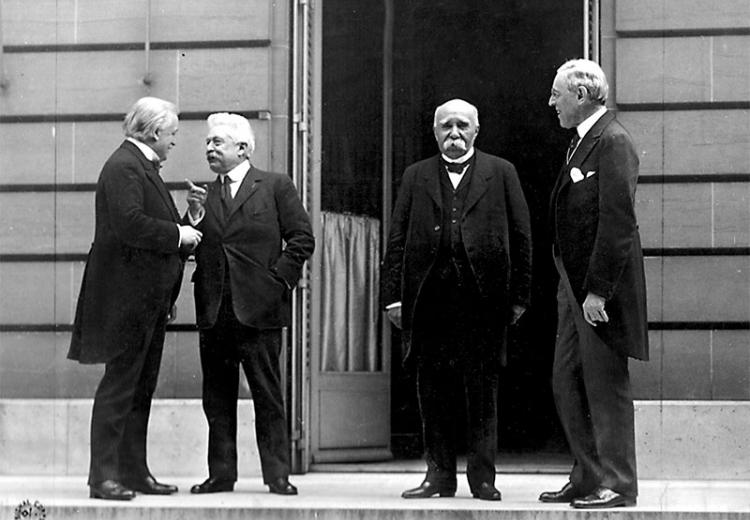The Great War: Evaluating the Treaty of Versailles

Council of Four at the WWI Paris peace conference, May 27, 1919 (candid photo) (L - R) Prime Minister David Lloyd George (Great Britian) Premier Vittorio Orlando, Italy, French Premier Georges Clemenceau, President Woodrow Wilson
Although at the postwar peace talks President Woodrow Wilson wished above all to prevent future wars, the Treaty of Versailles, which formally ended World War I, is widely considered to have contributed to the rise to power of the Nazi party in Germany. Was the Treaty of Versailles a legitimate and justified attempt by the victorious powers to ensure that Germany would never again pose a military threat? Or did the Treaty, as the Nazis and many other politicians in Germany claimed, place an unfair and unnecessarily punitive burden on Germany? Was the supposed unfairness of the Treaty a significant contributor to the rise of the Nazi party in Germany—or was it merely a convenient rhetorical tool for German politicians to exploit? If the unfairness of the Treaty were indeed a cause of fascism in Germany, how do we explain the rise of fascism in Italy (which fought on the side of the allies in World War I) or the existence of fascist movements in Britain, the Netherlands, and other Western democracies in the 1930s?
By studying a variety of primary sources, maps, and supporting documents concerning the post-war peace process, students will develop a context for evaluating whether the treaty was a viable, fair one, and for considering some of the complex questions this issue raises about the historical causality and responsibility. The lesson fits within a larger unit on World War I, and some prior knowledge of the causes and events of the war is assumed.
Guiding Questions
Were the terms of the Treaty of Versailles fair and justified?
To what extent was the Treaty of Versailles successful?
Was the Treaty of Versailles a turning point for U.S. foreign policy?
Learning Objectives
Evaluate the motives and aims of the Treaty of Versailles.
Evaluate the arguments presented regarding the treatment of Germany following WWI.
Evaluate how each country's unique wartime experience informed its motives at the Peace Conference.
Evaluate the consequences of key provisions regarding self-determination, reparations, alliances, colonialism, and armaments.
Assess the short and long term consequences of the Treaty of Versailles in Europe and globally.
